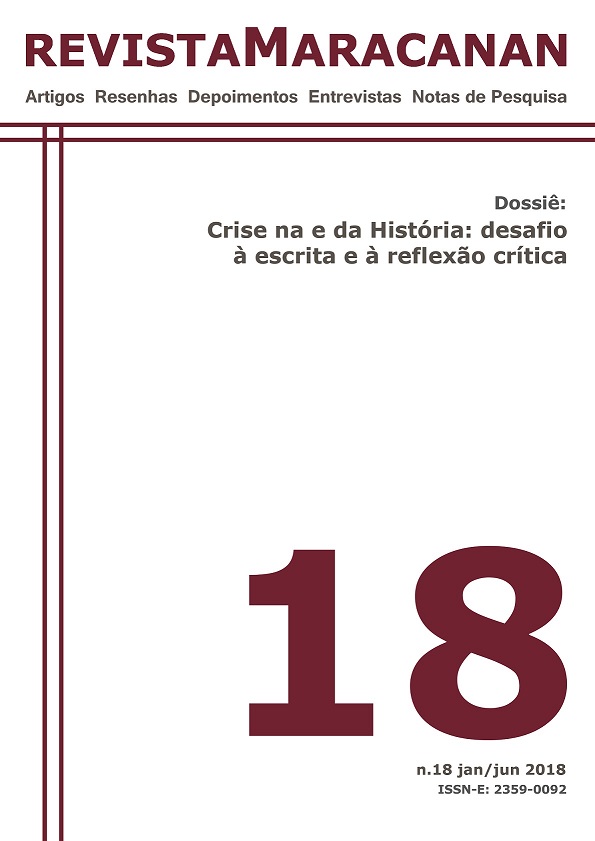The Pandorga and the Law: past-present-future
DOI:
https://doi.org/10.12957/revmar.2018.31248Keywords:
Brazilian business-military dictatorship, Crisis, Memory, Duration, TheaterAbstract
Going through the different times provoked by the theatre play The Pandorga and the Law (1983-1984), by João das Neves, this article intends to think the relations between memory and crisis in contemporary Brazil, starting from the concept of duration and its ramifications, inaugurated by Henri Bergson. This play was read for the first time in the 1st Seminary of the Grupo Tortura Nunca Mais - RJ (GTNM-RJ), held on October 28, 29, 30, 31 and November 1, 1985, at Cândido Mendes University. This Seminar formalized the foundation of the GTNM-RJ. Our reflections are based on the Brazilian business-military dictatorship. The duration time is multiple and qualitative more than a linear chronological and quantitative time. Which past, present and future incessantly interact, raising problems, reviving wounds, scars and opening gaps. Beyond the borders of time to look at the horrors of the past, to understand what remains of past in the present, and to consider what it can beckon us to the future, imposes itself as a challenge to the understanding of the contemporary Brazilian panorama.References
AGAMBEN, Giorgio. Estado de Exceção. São Paulo: Boitempo, 2004.
BENJAMIN, Walter. Magia e Técnica, Arte e Política. Ensaios sobre literatura e história da cultura. Obras Escolhidas. Vol. 1. São Paulo: Brasiliense, 1994.
BERGSON, Henri. A Energia Espiritual. São Paulo: WMF Martins Fontes, 2009.
COIMBRA, Cecília Maria Bouças. Doutrinas de Segurança Nacional: banalizando a violência. Psicologia em Estudo, Maringá (PR), DPI/CCH/UEM, v. 5, n. 2, p. 1-22, 2000.
COMPARATO, Fábio Konder. A Balança e a Espada. OAB SP (site). Publicado em: 27 ago. 2010. Disponível em: http://www.oabsp.org.br/noticias/2010/08/27/6376. Acesso em: 23 ago. 2017.
DELEUZE, Gilles; GUATTARI, Félix. O Anti-Édipo. Capitalismo e Esquizofrenia. São Paulo: Ed. 34, 2010.
DELEUZE, Gilles. Lógica do Sentido. São Paulo: Perspectiva, 2007.
DREIFUSS, René Armand. 1964: A Conquista do Estado. Ação política, poder e golpe de classe. Petrópolis, RJ: Vozes, 1987.
ELIAS, Norbert. Sobre o Tempo. Rio de Janeiro: Zahar, 1998.
ELOYSA, Branca (org.). I Seminário do Grupo Tortura Nunca Mais. Petrópolis: Vozes, 1987.
LEVI, Primo. Os Afogados e os Sobreviventes. Rio de Janeiro: Paz e Terra, 1990.
MERLINO, Tatiana; OJEDA, Igor (orgs). Direito à memória e à verdade: Luta, substantivo feminino. São Paulo: Caros Amigos, 2010.
NIETZSCHE, Friedrich. Segunda Consideração Intempestiva: Da utilidade e desvantagem da história para a vida. Rio de Janeiro: Relumé Dumará, 2003.
PELBART, Peter Pál. Biopolítica. Sala Preta, São Paulo, v. 7, p. 57-65, nov. 2007.
PEREIRA, Vinicius. Uma reflexão sobre a experiência da interpretação a partir de estados emocionais. In: CARREIRA, André (org.). Teatro e Experiências do Real (Quatro Estudos). Buenos Aires; Los Angeles: Argus-a Artes y Humanidades, 2016.
TARDE, Gabriel. Monadologia e sociologia e outros ensaios. São Paulo: Cosac Naify, 2007.
Downloads
Published
How to Cite
Issue
Section
License
The copyrights of originals and translations published are automatically assigned to Revista Maracanan. The information contained in this papers are the sole responsibility of the authors.
The Copyright of the published articles belong to Revista Maracanan, with works simultaneously licensed under a Creative Commons Attribution-NonCommercial-ShareAlike 4.0 International License, which allows the sharing of work with mandatory recognition of authorship and initial publication in this journal, under the same license and for non-commercial purposes.

The Revista Maracanan is licensed with a Creative Commons Attribution-NonCommercial-ShareAlike 4.0 Internacional License.





